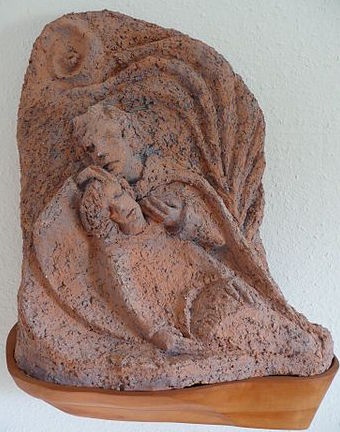by Laurie Gudim
Mary, a friend of ours, lost her son to mental illness. He died at home in a city on the other side of the country from where his mother and father lived. His body was not discovered for several days. When Mary and her husband were notified of his death, they had to fly out to claim his body and to clean and close up his apartment. It was a horror – an unimaginable, gut-wrenching job.
Their son’s neighbors, a husband and wife who lived in an apartment down the hall, literally took them in. They cleared out a room in their home and offered it free of charge. They fed these strangers and made available the use of a computer and phone. It was a gift beyond measure.
“And they weren’t even Christians,” Mary told us. “They were atheists.”
When Paul talked about seeking righteousness through works, I think of this story. It is not that I think that when Paul mentioned works he was thinking about the sort of giving that this atheist couple engaged in. He was speaking rather about the adherence to rules that marked the religious observance of his time. Not working on the sabbath, not touching unclean people, keeping strict dietary codes, keeping to the letter of the law in matters of hospitality and honor – these were the ways people in his day thought to establish themselves as being right with God. We do the same today when we adhere strictly to the proper way of doing things – to codes of purity rather than of hospitality.
Jesus imparted an entirely different understanding. For him being right with God meant being in relationship with God – being in an ever-deepening, ongoing, life-giving bond. What must we do to inherit eternal life? We must love God with all our heart, all our soul, all our strength and all our mind. And we must love our neighbor as ourselves. And who is our neighbor? The Good Samaritan.
The atheists in Mary’s tale are very much like this good man from another culture that Jesus portrays in his Good Samaritan story. And so I wonder: Is it enough, then, to engage in acts of love even if you have no relationship with God at all?
Perhaps I am thinking about the issue from the wrong direction. After all, am I in a position to judge the righteousness of the Good Atheists – or of anyone else, for that matter? No. So I may as well let that question be.
But I am challenged by the Good Atheists to explore just how real my relationship with God is. Does it lead me to radical acts of love? Does it make me open my arms, my pocket book and my home to the stranger whose need I see unfolding before me? Does it turn my world upside down?
And even so, there is something more basic still. It is this. Do I believe in the relationship? Do I know in my bones that God loves me, yearns for me and delights in me, just as I am? Seeking righteousness through belief means that I can put my faith in God’s love, even if that belief happens only sometimes and only a little bit at a time. Jesus became incarnate to give me the good news of God’s love for me. So here’s the real, bedrock question. Can I rest just there?
Laurie Gudim is a writer and religious iconographer who lives in Fort Collins, CO. You can view some of her work at Everyday Mysteries.
By Mraz – Own work, Public Domain,

